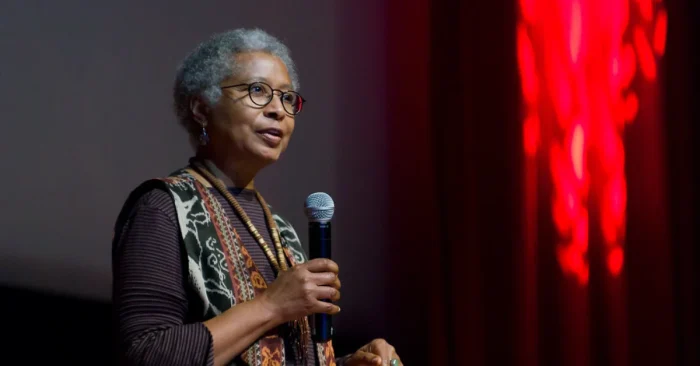Alice Walker – Biography
Early Life and Education of Alice Walker
Alice Walker was born on February 9, 1944, in Eatonton, Georgia, into a poor African American sharecropping family. Growing up in the segregated South, she faced poverty, racial discrimination, and gender inequality from an early age. At eight, an accident left her blind in one eye, leading to years of isolation. During this time, books became her refuge. Encouraged by her mother, who valued education despite limited means, Walker excelled in school. Her academic success earned her a scholarship to Spelman College in Atlanta. After two years, she transferred to Sarah Lawrence College in New York, where she graduated in 1965. While in college, Walker became active in the civil rights movement, experiences that would shape both her writing and activism.
Early Writing Career and First Works
After college, Walker worked as a social worker, teacher, and civil rights activist while nurturing her passion for writing. In 1968, she published her first poetry collection, “Once,” followed by her debut novel, “The Third Life of Grange Copeland,” in 1970. The novel explored themes of race, violence, and family struggles in the Black community. Her early work gained attention for its honest portrayal of African American life, especially from the perspective of women. Walker’s unique voice—blending personal experience, cultural history, and social commentary—quickly earned her recognition as a rising literary talent.
The Color Purple and International Fame
Walker’s most famous work, “The Color Purple,” was published in 1982. The novel tells the powerful story of Celie, a Black woman in early 20th-century Georgia, who overcomes abuse and hardship to find her voice and independence. Written in a distinctive epistolary style, the novel struck a chord with readers worldwide. “The Color Purple” won the Pulitzer Prize for Fiction and the National Book Award, making Walker the first Black woman to win the Pulitzer for fiction. In 1985, Steven Spielberg adapted the book into a critically acclaimed film, bringing Walker’s work to an even larger audience. The story’s emotional depth and portrayal of resilience continue to resonate across generations.
Championing Womanism and Activism
Alice Walker introduced the term “womanism” to describe a form of feminism that centers on the experiences of Black women and women of color. Her 1983 essay collection, “In Search of Our Mothers’ Gardens,” became a cornerstone of womanist thought, exploring creativity, history, and identity. Throughout her career, Walker has been a passionate advocate for civil rights, gender equality, environmental justice, and global human rights. Her activism extends beyond American borders, addressing issues like apartheid in South Africa and the Israeli-Palestinian conflict. Walker’s commitment to speaking out against oppression reflects her belief that art and activism are deeply connected.
Later Literary Works and Continued Influence
In the years following “The Color Purple,” Walker continued to write novels, poetry, and essays. Novels like “Possessing the Secret of Joy” (1992) tackled difficult subjects such as female genital mutilation, while “By the Light of My Father’s Smile” (1998) explored sexuality, family, and forgiveness. Her poetry collections, including “Horses Make a Landscape Look More Beautiful” and “Absolute Trust in the Goodness of the Earth,” reveal her deep spiritual connection to nature and humanity. Walker’s writing remains fearless, often addressing controversial topics with honesty and compassion. Her work continues to inspire conversations on healing, resilience, and justice.
Personal Life and Beliefs
Walker married Melvyn Leventhal, a Jewish civil rights attorney, becoming the first legally married interracial couple in Mississippi. They had one daughter before divorcing. Walker’s personal journey has often mirrored her activism, reflecting her beliefs in equality and freedom. She practices meditation and embraces holistic living, often writing about love, spirituality, and personal growth. While some of her views have sparked controversy, her willingness to express herself openly underscores her dedication to living authentically and courageously.
Legacy and Global Impact
Alice Walker’s influence extends far beyond literature. She has given voice to the struggles of Black women, highlighted global injustices, and inspired countless readers and activists. Through her storytelling, she has fostered empathy and understanding, challenging readers to confront uncomfortable truths about race, gender, and power. Her work continues to be studied and celebrated worldwide, securing her place as one of the most important literary and social voices of her time.
Conclusion
Alice Walker’s life and work exemplify the transformative power of storytelling. From her childhood in Georgia to her global prominence, she has used her voice to advocate for the marginalized and challenge societal norms. Her fearless writing and activism continue to inspire readers and activists, ensuring her lasting legacy as a literary icon and champion of justice.
Frequently Asked Questions (FAQs)
What is Alice Walker best known for?
She is best known for her Pulitzer Prize-winning novel “The Color Purple.”
What is womanism?
Womanism, coined by Walker, emphasizes the experiences of Black women within feminist discourse.
Has her work been adapted into film?
Yes, “The Color Purple” was adapted into a successful film in 1985 and later a Broadway musical.
Is Alice Walker still active?
Yes, she continues to write and advocate for human rights and social justice worldwide.
What themes define Walker’s work?
Her work explores race, gender, oppression, healing, spirituality, and resilience.

















